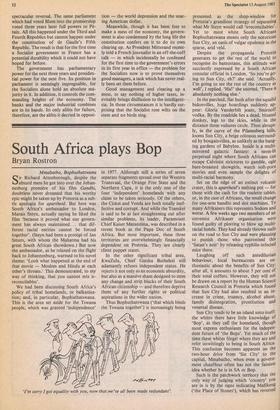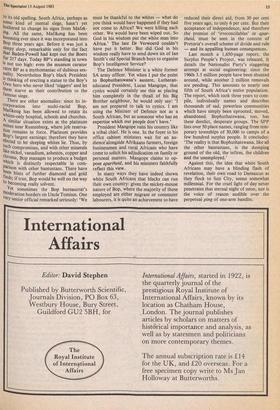South Africa plays Bop
Bryan Rostron
Mmabatho, Bophuthatswana C ir Richard Attenborough, despite the
absurd mess he got into over the Johan- nesburg premiere of his film Gandhi, doubtless never dreamed that his worthy epic might be taken up by Pretoria as a sub- tle apologia for apartheid. But here was South Africa's ambassador to London, Marais Steyn, actually saying he liked the film 'because it proved what our govern- ment has always maintained... that dif- ferent racial entities cannot be forced together'. (Steyn had been a protege of Jan Smuts, with whom the Mahatma had his great South African showdown.) But now the ambassador, as he relaxed on the flight back to Johannesburg, warmed to his novel theme: `Look what happened at the end of that movie — Moslem and Hindu at each other's throats.' This demonstrated, to my way of thinking, that you cannot mix ir- reconcilables'.
We had been discussing South Africa's policy of tribal homelands, or balkanisa- tion; and, in particular, Bophuthatswana. This is the area set aside for the Tswana people, which was granted `independence' in 1977. Although still a series of seven separate fragments spread over the Western Transvaal, the Orange Free State and the Northern Cape, it is the only one of the four 'independent' homelands with any claim to be taken seriously. Of the others, the Ciskei and Venda are both totally inef- fective and corrupt. And while the Transkei is said to be at last straightening out after similar problems, its leader, Paramount Chief Kaiser Matanzima, was described in a recent book as the Papa Doc of South Africa. But most important, these three territories are overwhelmingly financially dependent on Pretoria. They are clearly client puppet states.
In the other significant tribal area, KwaZulu, Chief Gatsha Buthelezi still adamantly refuses independent status. He rejects it not only as an economic absurdity, but also as a massive sham designed to stem any change and strip blacks of their South African citizenship — and therefore deprive them of any further rights or political aspirations in the wider nation.
Thus Bophuthatswana (That which binds the Tswana together') is increasingly being
`I'm sorry I got equality with you, now that we've all been made redundant'.
presented as the shop-window for Pretoria's grandiose strategy of separating what Mr Steyn would call (irrecoricilables% Yet to most white South Africans Bophuthatswana means only the notorious Sun City, an oasis of vulgar opulence in the sparse, arid veld.
Despite the propaganda Pretoria generates to get the rest of the world to recognise its bantustans, this attitude was succinctly expressed by a South African consular official in London. `So you're go- ing to Sun City, eh?' she said. 'Actually, I'm going to see the rest of the country as well', I replied. 'Hal' she snorted. 'There is absolutely nothing else.'
In the parched, flat bush after the squalid bidonvilles, huge hoardings suddenly ap- pear: Gloria Vanderbilt jeans, Smirnoff vodka. By the roadside lies a dead, bloated donkey, legs to the skies, while in the distance three vultures circle. Then abrupt- ly, in the curve of the Pilanesberg hills, looms Sun City, a beige colossus surround- ed by bougainvillea, as unlikely as the hang- ing gardens of Babylon. Inside is a multi- mirrored galactic fantasy: a neon-lit perpetual night where South Africans can escape Calvinist strictures to gamble, ogle bare-breasted showgirls, watch soft-porn movies and even sample the delights of multi-racial harmony.
Set on the edge of an extinct volcanic crater, this is apartheid's melting pot — for those with the cash for the roulette tables, or, in the case of Africans, the small change for one-arm bandits and slot machines. To many Afrikaners this represents Sodom and worse. A few weeks ago two members of an extremist Afrikaner organisation were found guilty of plotting to blow up multi- racial hotels. They had already thrown nails on the road to Sun City and were planning to punish those who patronised this `Satan's nest' by releasing syphilis-infected mice there.
Laughing. off such antediluvian behaviour, local bureaucrats are en- thusiastic about the benefits of Sun City: after all, it amounts to about 5 per cent of their total coffers. However, they will not be drawn on a report by the Human Science Research Council in Pretoria which found that Sun City had also resulted in an in- crease in crime, truancy, alcohol abuse, family disintegration, prostitution and venereal disease.
Sun City tends to be an island unto itself: the whites there have little knowledge of `Bop', as they call the homeland, though most express enthusiasm for the indepen- dent future of 'the Bops'. Yet much of the time these whites forget where they are and refer unwittingly to being in South Africa. This confusion becomes apparent on the two-hour drive from 'Sin City' to the capital, Mmabatho, when even a govern- ment chauffeur often has not the faintest idea whether he is in SA or Bop.
Such is the patchwork territory that the only way of judging which 'country' you are in is by the signs indicating Mafikeng (`the Place of Stones'), which has reverted
to its old spelling. South Africa, perhaps as some kind of mental siege, hasn't yet bothered to change its signs from Mafek- mg. All the same, Mafikeng has been booming ever since it was incorporated into Bop three years ago. Before it was just a sleepy dorp, remarkable only for the fact that Baden-Powell had kept out the Boers for 217 days. Today BP's standing in town Is not too high: even the museum curator rates BP as a mythomaniac of dubious sex- uality. Nevertheless Bop's black President Is thinking of erecting a statue to the Boy's °vt hero who never liked 'niggers' and let them starve as their contribution to the famous siege. There are other anomalies: since its in- corporation into multi-racial Bop, Mafikeng has been allowed to retain its whites-only hospital, schools and churches. A similar situation exists at the platinum mines near Rustenburg, where job reserva- tion
remains in force. Platinum provides Sop's largest earnings; therefore they have elected to let sleeping whites lie. Thus, by such compromises, and with other minerals 'Ike nickel, vanadium, asbestos, copper and Chrome, Bop manages to produce a budget which is distinctly respectable in corn- Parison with other bantustans. There have been hints of further diamond and gold finds; if true, Bop would be well on the way to becoming really solvent.
Yet sometimes the Bop bureaucrat's moderation borders on Uncle Tomism. One very senior official remarked seriously: 'We
must be thankful to the whites — what do you think would have happened if they had not come to Africa? We were killing each other. We would have been wiped out. So God in his wisdom put the white man into Africa.' The late Dr Verwoerd couldn't have put it better. But did God in his wisdom really have to send down six of Ian Smith's old Special Branch boys to organise Bop's Intelligence Service?
The Defence Minister is a white former SA army officer. Yet when I put the point to Bophuthatswana's austere, Lutheran- educated President, Lucas Mangope, that cynics would certainly see this as placing him completely in the thrall of his Big Brother neighbour, he would only say: 'I am not prepared to talk to cynics. I am using the Minister of Defence not as a South African, but as someone who has an expertise which our people don't have.'
President Mangope runs his country like a tribal chief. He is one, In the foyer to his office cabinet ministers wait for an au- diencealongside Afrikaans farmers, foreign businessmen and rural Africans who have come to solicit his adjudication on family or personal matters. Mangope claims to op- pose apartheid, and his ministers faithfully reflect this view.
In many ways they have indeed shown white South Africans that blacks can run their own country: given the mickey-mouse nature of Bop, where the majority of those employed are either migrant or commuter labourers, it is quite an achievement to have
reduced their direct aid, from 30 per cent five years ago, to only 6 per cent. But their acceptance of independence, and therefore the premise of 'irreconcilables' or apar- theid, must be seen in the context of Pretoria's overall scheme of divide and rule — and its appalling human consequences.
Last month a 1,650-page report, the Surplus People's Project, was released. It details the Nationalist Party's staggering attempt at social engineering: since the 1960s 3.5 million people have been shunted around, while another 2 million removals are pending. This amounts to nearly one fifth of South Africa's entire population. The report, which took three years to com- pile, individually names and describes thousands of sad, powerless communities which have simply been uprooted, moved, abandoned. Bophuthatswana, too, has these derelict, desperate groups. The SPP lists over 50 place names, ranging from tem- porary townships of 30,000 to camps of a few hundred surplus people. It concludes: 'The reality is that Bophuthatswana, like all the other bantustans, is the dumping ground of the old, the infirm, the children and the unemployed.'
Against this, the idea that white South Africans may have a blinding flash of revelation, their own road to Damascus as they flock to Sun City, seems somewhat millennial. For the cruel light of day never penetrates that eternal night of neon, nor is the voice of reason audible over the perpetual ping of one-arm bandits.







































 Previous page
Previous page